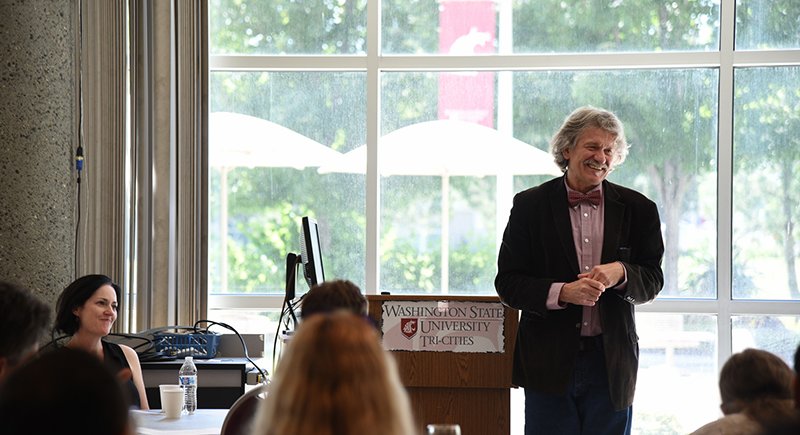
September 11, 2017 New vice chancellor to highlight campus strengths as means to fulfill regional community needs
By Maegan Murray
Martin Klotz, the new Washington State University Tri-Cities vice chancellor of academic affairs, hopes to focus on the university’s unique strengths to meet the needs of not only the Tri-Cities regional community, but also the state and nation.
A microbiologist and academic by profession, Klotz said what he likes most about WSU Tri-Cities is that it has its own unique focal points within the WSU system that serve to meet a greater need in the science, technology, engineering and mathematics fields – all while maintaining a base in the liberal arts.
“We have many focus points that are unique to WSU Tri-Cities, from our Bioproducts, Sciences, and Engineering Laboratory, to our world-class wine science center, to what we offer through our nursing and medical programs,” he said. “Environmental health is big in this area because of the Hanford Site and other related areas, and agriculture and food processing continue to grow. There is a need for managing the business aspects of those fields and there is also an engineering application that is crucial for many of these areas. Educators provide training at all levels of their profession, ranging from teaching in public schools to leadership in higher education, public officiating and industry.”
Klotz comes to WSU Tri-Cities from Queens College, City University of New York, in Flushing, New York, where he was dean of faculty for the division of mathematics and natural sciences and professor of biology. Prior to that, Klotz held academic positions at the University of North Carolina at Charlotte where he served as professor and chair of the department of biological sciences, the University of Louisville in the departments of biology and microbiology and immunology and the University of Colorado Denver in the department of biology.
For most of his career, Klotz directed his evolutionary and genomic microbiology laboratory to study the molecular underpinnings of ammonia- and methane-oxidizing bacteria, with an interest in the metabolic reconstruction of key catabolic pathways, the evolutionary history of involved inventory and how this inventory is being regulated. His research has been funded by federal and state grants agencies in excess of $4 million. He also contributed to the editing of three books on nitrogen cycle research and is an author and co-author of more than 100 peer-reviewed articles.
Klotz said one of the greatest needs in the world today is to secure global health, which extends to a number of academic areas at WSU Tri-Cities. He said this is not only due to the need for more scientists, physicians and health professionals, but also out of a need for academic study, research development and product development for all areas of the field.
“We have a system-wide nursing program and our new medical school, but the question is what are the additional opportunities in allied health professions for this campus and how do we get there?” he said. “Our health is not only determined by what happens on the inside of our bodies, but also what happens on the outside in the environment. One of the main industries of Washington state is agriculture, but it is also a major polluter and extractor of resources. It is an opportunity, responsibility and a challenge at the same time. It is really an opportunity that waits to be harnessed.”
Klotz said WSU Tri-Cities needs to identify basic areas that will feed into all of these opportunities.
“One of these basic areas is in the biological sciences, and particularly, microbiology, because it will feed into existing strength in bioengineering, agriculture and wine science, and it is a foundational discipline for academic programs and training with a focus on human and environmental health,” he said.
Klotz said he also intends to focus on growing needs for mathematics, statistics and data science at WSU Tri-Cities, as it also feeds into nearly all areas. He said a strong academic focus on algorithmic approach not only sets a foundation for a range of other academic areas – it is also a crucial component of complex thinking.
Klotz said he is excited to join the team at WSU Tri-Cities and looks to build on many initiatives already taking place on campus while building coalitions for seizing new opportunities.
“We have a highly motivated faculty and staff and everyone is engaged and really trying to make sure that everything works across the board,” he said. “I hope to facilitate paths to reach these goals and contribute also to translating the strategic plan that exists for WSU as a system into tasks and sub goals on our campus.”
Klotz said the mission of four-year higher education institutions is to not only graduate more students with a career-informed degree in time, but it is also to afford faculty and students with opportunities for scholarship and creative activity.
“Every academic direction and college represented here is important,” he said. “They all have their specific roles to play in forming a career-prepared graduate and they contribute to and build on a sound liberal arts education. Even though this is a STEM-focused campus, this is not just rooted in science and engineering. There are many opportunities for scholarship in the fine and liberal arts, in business, education and the health sciences.”





